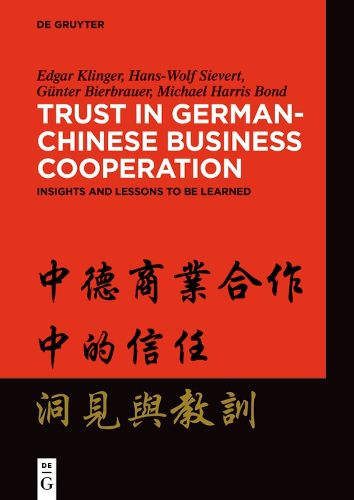Readings Newsletter
Become a Readings Member to make your shopping experience even easier.
Sign in or sign up for free!
You’re not far away from qualifying for FREE standard shipping within Australia
You’ve qualified for FREE standard shipping within Australia
The cart is loading…






What makes international joint ventures successful? Among other key success factors such as strategic fit, material and political-relational incentives, and the cultural compatibility of the joint venture partners, the role of one factor in the successful establishment and management of joint ventures is critical: the mutual trust among the managers involved.
This book explores how to establish, develop, and continue to nurture mutual trust between the managers of German and Chinese joint ventures. A series of guided interviews conducted by the authors reveals assessments of Chinese and European executives about their mutual trust in the context of the cultural differences between the two countries, the worldviews characterizing China and Germany, and their impact on the behavior of their executives. The authors then use these judgements from the interviews to make recommendations for action to build more successful cooperation in German-Chinese business cooperation in future joint enterprises.
Trust in German-Chinese Business Cooperation is essential reading for managers of international companies and students of business management, business psychology and intercultural management.
$9.00 standard shipping within Australia
FREE standard shipping within Australia for orders over $100.00
Express & International shipping calculated at checkout
What makes international joint ventures successful? Among other key success factors such as strategic fit, material and political-relational incentives, and the cultural compatibility of the joint venture partners, the role of one factor in the successful establishment and management of joint ventures is critical: the mutual trust among the managers involved.
This book explores how to establish, develop, and continue to nurture mutual trust between the managers of German and Chinese joint ventures. A series of guided interviews conducted by the authors reveals assessments of Chinese and European executives about their mutual trust in the context of the cultural differences between the two countries, the worldviews characterizing China and Germany, and their impact on the behavior of their executives. The authors then use these judgements from the interviews to make recommendations for action to build more successful cooperation in German-Chinese business cooperation in future joint enterprises.
Trust in German-Chinese Business Cooperation is essential reading for managers of international companies and students of business management, business psychology and intercultural management.